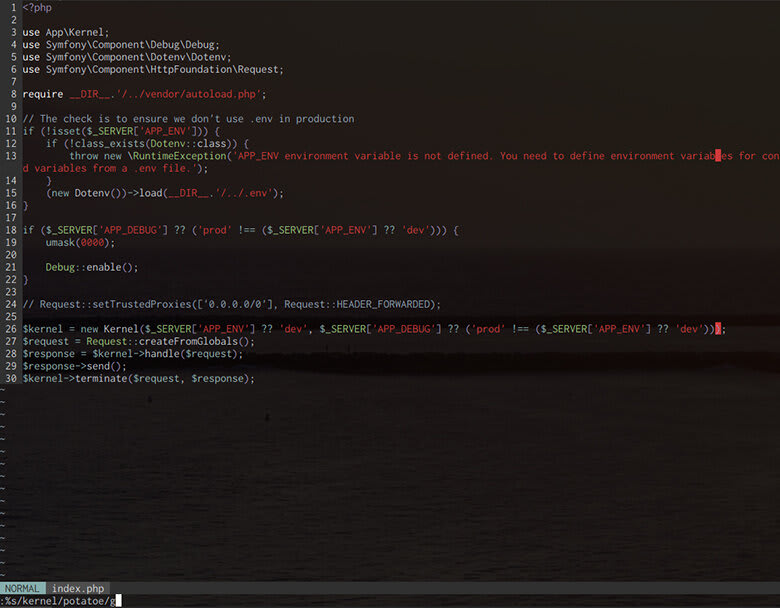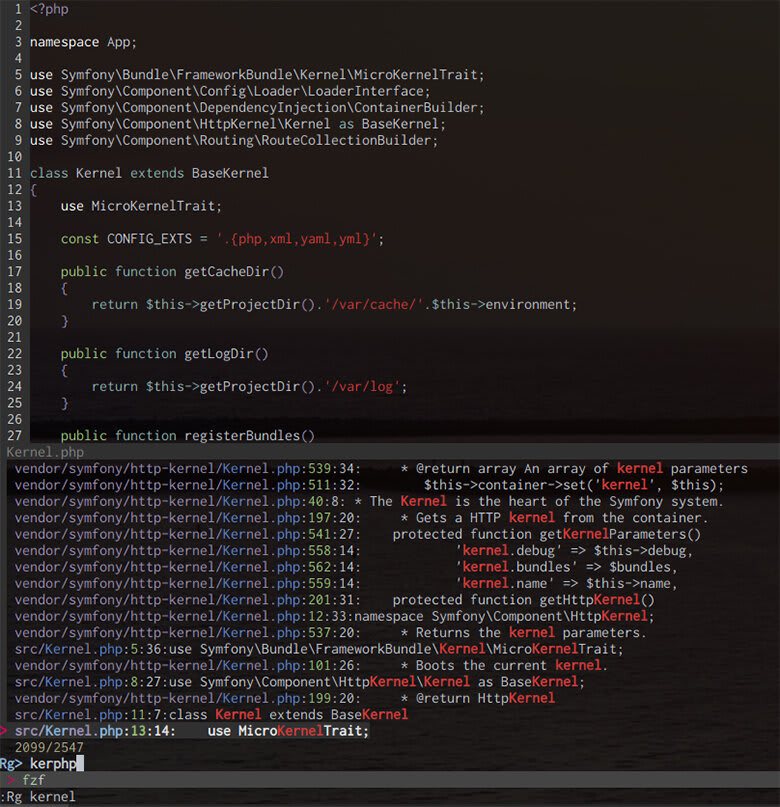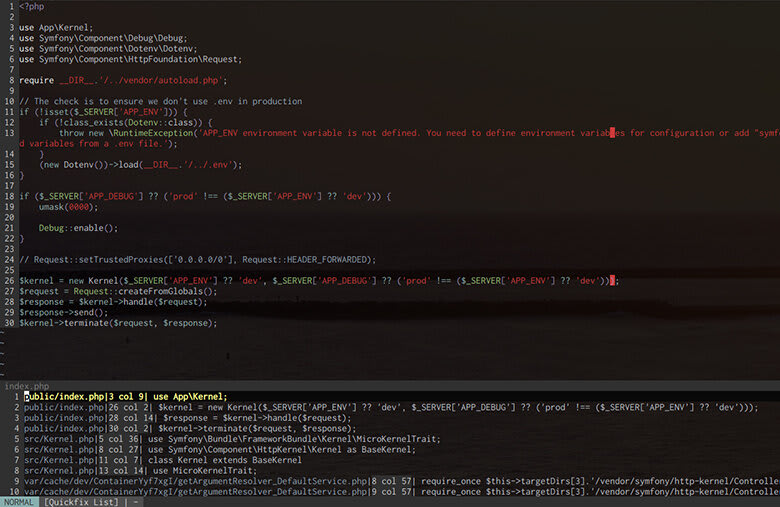Can developers survive without a good search in their editor? Who has never used the famous find and replace trick in one or multiple files?
Nobody indeed.
The good new is: Vim search features are pure awesomeness. With a minimum of configuration, you can search whatever you want, wherever you want, at light speed.
We'll see in this article how to:
- Search in the current file.
- Search in multiple files.
- Find and replace everything you dream of.
- Use great plug-ins to transform Vim in a Search Monster™.
Without the search features I'll present you in this article, Vim would maybe not be part of my Mouseless Development Environment.
I'm currently writing a book to build your own Mouseless Development Environment, where I explain how to combine powerful tools to improve and customize your development worklow.
A little precision: I will often refer to Vim current working directory in this article. The ex command :pwd can tell you what's yours. To change it, you can use :cd mydirectory.
If you don't feel comfortable using Vim, I cover the basics you need to know here.
Enough babbling. Let's launch Vim, and let's search! I invite you to try the tips of this article while you read them: it will help you learn and remember.
Vim Search in the Current File
Basics
To search in the current file, you just need to type / in normal mode. Then, you need to type your search pattern, press enter, and the result becomes highlighted in your file.
To go backward and forward through the results, you can type n and N (for next) respectively.
Using / will search forward in the file. If you need to directly search backward, you can use ? instead.
Search Highlighting
It's practical to see the search highlighted in the file, but it's not enabled by default. To do so, you can type the command :set hlsearch, or set it permanently in your vimrc.
If you use Neovim, the highlighting is set by default.
Clearing the Last Search Highlight
The command :noh in normal mode will clear this highlight you tried to get rid of by trying (almost) every button on your keyboard. You know, like when you tried to quit Vim the first time.
Since you don't really want to type this command each time you do a search, you can map a key to this command in your vimrc as follows: map <esc> :noh<cr>.
Each time you will type esc, you will clear the last search highlighted and therefore keep your sanity. Lucky you.
Searching the Word Under the Cursor
To search the word under your cursor:
- Place your cursor on the word you want to search.
- Type
*org*.
As with /, every result will be highlighted.
To search for partial words (including word parts in the results), you can use the keystroke g*.
Search With Case Sentitive / Insensitive
If you want to ignore the case, here you go:
-
/search\C- Case-sensitive search. -
/search\c- Case-insensitive search.
You can as well write the following command in your vimrc:
-
set ignorecase- All your searches will be case-insensitive. -
set smartcase- Your search will be case-sensitive if it contains an uppercase letter.
Be aware that ignorecase needs to be set for smartcase to work.
Vim Search in Multiple Files
Searching in one file is great, but what about a whole project? It's where you realize that Vim is crazy fast.
Searching with vimgrep
Searching with vimgrep will populate the quickfix list (see :help quickfix and :help quickfix-window in Vim) with the result of the search.
It implies that you need to use the command :cnext (or :cn) and :cprev (or :cp) to go through the results (instead of n and N respectively).
You can as well open the quickfix window with :copen and go through the results.
For example:
-
:vimgrep pattern *- Search the pattern in every file of the working directory. -
:vimgrep pattern a.txt b.txt c.txt- Search the same pattern only in the files "a.txt", "b.txt" and "c.txt". -
:vimgrep pattern *.php- Search "pattern" in every php files. -
:vimgrep pattern **/*.php- Search "pattern" in every php files in the working directory and every subdirectory.
Quick tip: since the command @: repeat your last command, you can go through all your results by taping :cnext and then only using the @: keystroke.
For more information about vimgrep, I strongly advice you to look at the excellent vimcast about it.
I encourage you to read Vim's help about vimgrep by typing :help vimgrep. Actually, I encourage you to use Vim's help as often as you can.
Searching with grep
Vimgrep is good but unfortunately "slow". Don't panic: compared to some IDE, it's still fast.
As an alternative you can use the external grep directly in Vim. Obviously you need grep to be installed on your machine. Something tells me that it is.
Using grep and vimgrep is similar. For example:
-
:grep mySearch *- Search every occurences ofmySearchin the working directory -
:grep mySearch a.txt b.txt c.txt- Search every occurences ofmySearchin the files a.txt, b.txt, c.txt
I won't cover here every use of grep. You can read more about it in the official (man grep or grep manual). For its use in Vim you can type execute :help grep.
Vim Find and Replace
Substitution In the Current File
Vim has a powerful find and replace functionality thanks to the substitute command.
Let's look at some examples:
-
:s/pattern/replace/g- Substitute "pattern" by "replace" on the current line. -
:%s/pattern/replace/g- Substitute "pattern" by "replace" in the current file. -
:%s//replace/g- Substitute your last search by "replace" in the current file.
You may ask yourself: what the hell those letters and signs mean? Good question!
- The letter
sstands forsubstitute. - The keyword
%will target the entire file instead of the current line. You can use it with different commands in different context. - The keyword
gmeans "global": more than one occurrence is targeted. Without it, only the first occurrence in the file (or the in line) would be replaced.
Those are the most common substitute command you'll use. I encourage you to consult Vim's help (again?) by typing :help substitute. I'll never say it enough.
Note that the substitute command can be grandly enhanced by the excellent Tim Pope's vim-abolish plugin. A must have for every cool Vim users out there!
And I know you're cool.

This substitute will crash Symfony 4 kernel
Find and Replace One Occurrence at a Time
It's very simple to search and then decide if you want to keep or replace each result in a file:
- Execute a regular search with
/. - Use the keystroke
cgnon the first result to replace it. - Type
norNto go to the next result. - Use
.to replace the occurrence with the same replacement, or go to the next result if you want to keep it.
What is this cgn keystroke you may ask? What does it mean? If you read :help gn, you'll see that gn is the same as n, except that it will start Visual mode and select the occurrence. We just do a change (c) on the next (selected) searched occurrence. From there, you can easily understand that keystrokes like cgN or dgn will work as well.
With this simple technique, you can do a granular find and replace in the whole file.
Find and Replace in Multiple Files
To find and replace in multiple files, you can use the excellent Vim arglist. Think of it as an internal list of files you can modify.
If you want to replace an occurrence in every html and twig files, you can type the following:
-
:arg *.html- Empty the buffer and populate the arglist with allhtmlfiles in the current working directory. -
:argadd *.twig- Addtwigfiles to the arglist. -
:argdo %s/pattern/replace/ge | update- Replace the occurencepatternbyreplacein every file of the arglist.
At that point you might scream to your screen, violently shacked by extrem curiosity: what means e at the end of the substitute command? It prevents Vim to display an error message when the pattern is not found in a file.
What about doing a find and replace for the files in the working directory and the subdirectories? You need to populate the arglist as follows:
:arg **/*.html:argadd **/*.php
You need to find and replace in the open buffer? Easy! I expected you to have more difficult questions. You can execute:
:bufdo %s/pattern/replace/ge | update
Do you know what I encourage you to read? :help arglist.
Vim Search with External Plugins
It's good to know how to search in bare bone Vim, especially when you're lost in a remote server far aways from your lovely vimrc
I have a good new: there are better alternatives for vimgrep, grep or using the arglist to find and replace in files. The plugins described here might change your search life forever!
Since we speak about Vim plugins, I wrote another article which list the necessary Vim plugins to build a Vim PHP IDE, in case you're interested.
One Plugin to Rule Them All, One Plugin to Find Them
If there is one plugin I would take with me on a lost inhabited island (with a computer and Vim), it would be fzf.vim with its terminal twin fzf. This is a must-have. I beg you to try it. Here's why:
- It's blazing fast (written in Go). Einstein was wrong: you can go beyond light speed.
- It allows you to search in your terminal whatever file or history you want.
- It can be coupled with Vim to search in many stuff like buffers, tags, the command history, the open files history…
Here are some basic examples:
-
:Files- Search a file in your working directory and subdirectories -
:Buffers- Search a file open in one of your buffer -
:History- Search a file in your open file history
Simple and highly configurable.
Search, Vim, Search! Faster!
fzf is a powerful tool, but it's not enough to search a precise occurrence in a bunch of files. You need another crazy fast terminal program: ripgrep.
This tool is very similar to grep. Actually, if you look closer at its name, it even tries to kill grep. Coupled to fzf, ripgrep will bring under your little fingers the best search engine I've ever seen in any IDE. No more, no less.
In order to link fzf with ripgrep, you can look at my fzf config file on Github.
Then you just have to enter the command :Rg pattern to search "pattern" in every file in the working directory.

The sweet combo fzf and ripgrep
You can use as well ripgrep instead of grep for the :grep command. In the terminal, you call it with rg.
Find and Replace in Multiple Files with Vim ferret
The last plugin I use is ferret. It allows you to search an occurrence in multiple files, select what results you want to replace, and finally replace them. If you have ripgrep installed on your system, this plugin will use it by default.
Here's how it works:
-
:Ack pattern- Search in the working directory. -
:Ack pattern /path/to/directory- Search in the specified path and its subdirectories.
At that point, Ferret will populate the quickfix window with every result found.
You can delete the result by typing dd, in case you don't want to replace it. You can as well type enter to open the file with the result highlighted.
Then, typing :Acks /pattern/replacement/ will replace every results still present in the quickfix window.
Simple, granular, and powerful: that's what we want.
Vim is Now Your Personal Search Beast
This overview will bring you whatever search functionality you need as a developer.
I personally use built-in vim search functionality when I search (or search in replace) in one file. When the search needs to be in a whole project, or in multiple files, I use the combo:
If you know other functionalities (or plugins) which can bring even more coolness in our search life, the comment section is ready for you.
You know, sharing is caring.





Top comments (2)
Thank you so much for this! 🙏
You're welcome 🙂